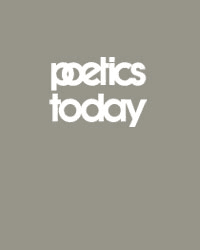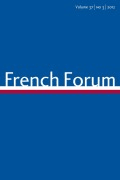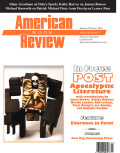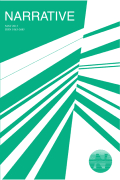
POETICS TODAY
Scope & Guideline
Unveiling New Perspectives in Literary Studies
Introduction
Aims and Scopes
- Literary and Narrative Theory:
The journal focuses on literary and narrative theory, exploring how narrative structures influence understanding and interpretation in literature. - Impact of Technology on Literature:
A significant emphasis is placed on the impact of technology, particularly artificial intelligence, on literature and authorship, including discussions on AI as a narrative force. - Cultural Critique and Poetics:
POETICS TODAY examines cultural phenomena through a poetic lens, analyzing how literature interacts with societal issues, identity, and cultural narratives. - Interdisciplinary Approaches:
The journal promotes interdisciplinary approaches, integrating insights from philosophy, aesthetics, and media studies to enrich literary analysis. - Historical Contextualization:
It provides historical perspectives on literary movements and theories, linking past practices to contemporary literary discourse.
Trending and Emerging
- Artificial Intelligence in Literature:
The exploration of AI's role in literature and narrative is a burgeoning theme, with numerous papers investigating AI's implications for authorship, creativity, and literary criticism. - Narrative in Digital Contexts:
There is a growing interest in how narratives are constructed and experienced in digital contexts, reflecting the changing nature of storytelling in the age of social media and digital platforms. - Interdisciplinary Narratology:
Emerging interdisciplinary approaches that blend narrative theory with other fields, such as cognitive science and digital humanities, are becoming more prominent. - Ecocriticism and Environmental Narratives:
The journal is increasingly addressing ecological themes, exploring how literature engages with environmental issues and reflects on human-nature relationships. - Cultural Memory and Identity:
Papers focusing on cultural memory, identity, and the narrative constructions of these concepts are trending, emphasizing the role of literature in shaping collective memory.
Declining or Waning
- Traditional Literary Forms:
There has been a noticeable decline in papers focusing solely on traditional literary forms and genres, as the journal increasingly gravitates towards contemporary and hybrid forms of expression. - Static Authorship Paradigms:
Discussions centered around static notions of authorship are less frequent, as the evolving landscape of digital and AI narratives reshapes the understanding of what it means to be an author. - Purely Historical Literary Criticism:
The journal has moved away from purely historical literary criticism, favoring more dynamic and contextually relevant approaches that engage with current cultural and technological developments. - Conventional Aesthetic Theories:
Conventional aesthetic theories are seeing less emphasis, as the focus shifts towards more critical and contextual analyses of aesthetics in relation to contemporary issues. - Fixed Interpretive Frameworks:
There is a waning interest in fixed interpretive frameworks, with scholars favoring more fluid and adaptable approaches to understanding texts.
Similar Journals

FRENCH FORUM
Redefining French Studies through Innovative ScholarshipFRENCH FORUM is a distinguished journal published by the Department of Romance Languages at the University of Pennsylvania, focusing on the rich tapestry of literature, visual arts, and performing arts within the French-speaking world. With an ISSN of 0098-9355 and an E-ISSN of 1534-1836, the journal has evolved since its inception, now covering diverse topics from 2002 to 2023. Although currently ranked in the fourth quartile in both Literature and Literary Theory and Visual Arts and Performing Arts, it provides a platform for emerging voices and critical discussions, making it an essential resource for scholars and practitioners alike. FRENCH FORUM aims to cultivate interdisciplinary dialogue, offering insights that resonate with contemporary cultural and literary studies while supporting the exploration of both canonical and avant-garde works. Despite its open access status, the journal continues to be a relevant player in academia, inviting contributions that challenge, shape, and redefine the landscape of French studies.

Literary Voice
Connecting Scholars to Contemporary Literary DebatesLiterary Voice is a pioneering journal dedicated to the exploration and critique of literature and its multifaceted dimensions. Established in Punjab, India, and published by LITERARY VOICE, this journal aims to serve as a vital platform for scholars, researchers, and enthusiasts in the field of literary studies. With its ISSN 2277-4521 and E-ISSN 2583-8199, Literary Voice strives to foster intellectual discourse and encourage innovative scholarship through diverse thematic issues. While currently operating without an open access model, the journal provides a crucial space for the dissemination of original research and critical analysis that contribute to the enrichment of literary understanding. As an emerging publication in the humanities, Literary Voice invites submissions from across the globe, making it an essential resource for those looking to engage with contemporary literary debates and foster cross-cultural dialogues.

FABULA
Cultivating Scholarly Excellence in Literary StudiesFABULA is a distinguished academic journal published by WALTER DE GRUYTER GMBH, focused on the fields of Cultural Studies and Literature and Literary Theory. Since its inception in 1958, FABULA has contributed significantly to the discourse surrounding narrative theory, literary analysis, and cultural criticism, positioning itself as a vital platform for innovative research. With a Q2 ranking in Literature and Literary Theory and a Q3 ranking in Cultural Studies for 2023, the journal demonstrates its commitment to high-quality scholarship while fostering interdisciplinary dialogue among researchers and professionals. Although it currently does not offer Open Access options, its rigorous selection process ensures that published works meet the highest academic standards. Located in Berlin, Germany, FABULA remains a crucial resource for scholars seeking to deepen their understanding of the complexities inherent in narrative forms and their cultural implications, supporting ongoing research endeavors from 1964 through 2024.

Current Writing-Text and Reception in Southern Africa
Fostering Scholarly Engagement in Literary TheoryCurrent Writing-Text and Reception in Southern Africa is a premier journal published by Routledge Journals, Taylor & Francis Ltd., specializing in the vibrant field of Literature and Literary Theory. With ISSN 1013-929X and E-ISSN 2159-9130, this journal has been a pivotal platform for scholarly discourse since its inception in 1989, continuing through to 2024. Located in the United Kingdom, it emphasizes the uniquely diverse literary landscape of Southern Africa, making it an essential resource for researchers, professionals, and students who engage with the rich cultural narratives of the region. Ranking in the Q3 category for Literature and Literary Theory, it holds a commendable position in the Scopus ranks, situated at #424/1106 with a 61st percentile, highlighting its influence and relevance in academic discussions. Though not open access, this journal serves as a vital conduit for innovative research, critical analysis, and theoretical exploration, underpinning the significance of text and reception in contemporary literary studies.

Enthymema-International Journal of Literary Criticism Literary Theory and Philosophy of Literature
Exploring the Depths of Literary ThoughtEnthymema - International Journal of Literary Criticism, Literary Theory and Philosophy of Literature, published by Milano University Press, is a leading open-access platform dedicated to the dynamic fields of literary criticism and theory as well as the philosophy surrounding literature. With an ISSN of 2037-2426, this esteemed journal has been fostering scholarly dialogue and innovative discourse since its inception in 2009. As a member of the prestigious Q2 quartile in the Literature and Literary Theory category as of 2023, Enthymema ranks favorably within the Scopus framework, currently positioned at #599 out of 1106 journals, reflecting a robust engagement with current academic trends. The journal emphasizes inclusivity and accessibility, ensuring that cutting-edge research and critical insights are available to a wider audience without financial barriers. With its significant focus on contemporary debates and theoretical advancements, Enthymema serves as an essential resource for researchers, professionals, and students eager to navigate the intricate landscapes of literary studies.

Novoe Literaturnoe Obozrenie
Cultivating Critical Perspectives in Cultural StudiesNovoe Literaturnoe Obozrenie, an esteemed publication dedicated to the realms of Cultural Studies and Literature and Literary Theory, serves as a vital resource for scholars and professionals alike. Published by NOVOE LITERATURNOE OBOZRENIE-NEW LITERARY OBSERVER in the Russian Federation, this journal provides critical insights and scholarly critiques that reflect the evolving landscape of literary discourse. With an established H-index and a focus on fostering academic inquiry, the journal has secured its place amidst contemporary scholarly discussions, indexed in Scopus with rankings that illustrate its commitment to quality despite a current presence in the lower quartiles. Novoe Literaturnoe Obozrenie is a non-open-access journal, encouraging a traditional yet scholarly approach to literary studies and remains an essential read for researchers, students, and professionals that seek to deepen their understanding of literature’s impact on culture and society. Publishing from 2016 until 2024, it continues to bridge theoretical frameworks with practical discourse, making significant contributions to the fields it encompasses.

TEXT & KRITIK
Advancing literary discourse through critical insight.TEXT & KRITIK, an esteemed academic journal published by EDITION TEXT KRITIK GMBH in Germany, serves as a critical platform for advancing scholarship in the fields of literature and literary theory. With an ISSN of 0040-5329, this publication aims to foster rigorous discourse and stimulate intellectual inquiry from 2009 to 2023, reflecting the evolving landscape of literary studies. Although categorized in the fourth quartile (Q4) in the 2023 measure of literature and literary theory, TEXT & KRITIK consistently engages with a diverse array of literary perspectives and methodologies, addressing both historical texts and contemporary literature. Researchers, professionals, and students alike are encouraged to explore this resource to deepen their understanding of critical texts and theoretical frameworks. While it does not currently operate on an open access model, its curated content remains a vital resource for anyone dedicated to exploring the nuances of literary analysis and criticism.

AMERICAN BOOK REVIEW
Cultivating a Platform for Diverse Literary NarrativesAMERICAN BOOK REVIEW is a pivotal journal in the fields of Cultural Studies and Literature and Literary Theory, published by the University of Houston, Victoria - Art & Science. Esteemed for its critical engagement with contemporary literary discourses, the journal provides a platform for scholars and practitioners to explore diverse narratives and theoretical frameworks that shape our understanding of literature. With an ISSN of 0149-9408 and E-ISSN 2153-4578, it serves as an essential resource for those seeking to deepen their insights into the intersection of literature and culture. Although positioned in the Q4 category for both Cultural Studies and Literature in 2023, the journal emphasizes the importance of inclusivity in academic dialogue, aiming to elevate lesser-heard voices in literary critique. Despite its challenging Scopus ranking, its commitment to fostering innovative scholarship makes it a noteworthy asset for researchers, professionals, and students alike. The journal's address is located at 3007 N Ben Wilson, Victoria, TX 77901, United States.

RLC-REVUE DE LITTERATURE COMPAREE
Unveiling the Complexities of Textual InteractionsRLC-REVUE DE LITTERATURE COMPAREE, published by DIDIER-ERUDITION, is a prominent French journal focused on comparative literature and literary theory, holding an ISSN of 0035-1466. Established in 2001, the journal aims to foster scholarly exchange and critical analysis in the field of literature, examining texts across cultures and disciplines. With its current categorization in the Q4 quartile for literature and literary theory as of 2023 and holding a Scopus rank of #880 out of 1106, RLC remains an accessible resource for researchers, professionals, and students alike. While it operates under a traditional access model, it continuously strives to contribute to the academic discourse within its scope, enhancing the understanding of literary complexities and intercultural exchanges. Based in the heart of Paris, at 6 RUE DE LA SORBONNE, the journal invites contributions that explore innovative perspectives and methodologies in literary studies through its ongoing commitment to scholarly excellence.

NARRATIVE
Illuminating the Intersection of Story and SocietyNARRATIVE is a distinguished academic journal published by Ohio State University Press, focusing on the intricate dimensions of literature and literary theory. Established in 2002, this journal has quickly risen to prominence, currently ranking first quartile (Q1) in its field according to 2023 metrics, and securing an impressive percentile of 94th among 1106 journals in Arts and Humanities. With its ISSN 1063-3685 and E-ISSN 1538-974X, NARRATIVE is committed to exploring the narrative structures and processes that shape our understanding of both literature and broader cultural phenomena. Although it does not offer open access, NARRATIVE proudly contributes to academic discourse by publishing articles that challenge, inform, and inspire scholars, professionals, and students worldwide. The journal continues to be an essential platform for innovative research and critical analysis, fostering dialogue at the intersection of storytelling, identity, and societal context.